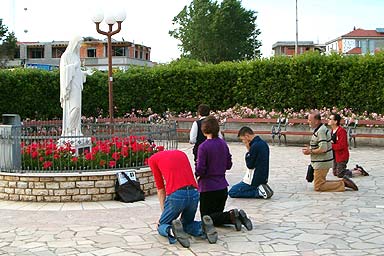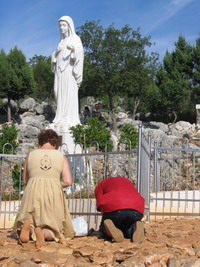MORE FOR THE PROTESTANTS
"With [Constantine's father] Constantius Cholorus (A.D. 305) there ascended the throne [of the Roman Empire] a solar dynasty which . . . professed to have 'Sol Invictus' as its special protector and ancestor. Even the Christian emperors, Constantine and Constantius, did not altogether forget the pretensions which they could derive from so illustrious a descent."--Franz F.V.M. Cumont, "Astrology and Religion Among the Greeks and Roman," p. 55.
"When Christianity conquered Rome, the ecclesiastical structure of the pagan church, the title and the vestments of the 'pontifex maximus,' the worship of the 'Great Mother' goddess and a multitude of comforting divinities, . . . the joy or solemnity of old festivals, and the pageantry of immemorial ceremony, passed like material blood into the new religion,--and captive Rome conquered her conqueror. The reins and skills of government were handed down by a dying empire to a virile papacy."--Will Durant, "Caesar and Christ," p. 672.
"The power of the Caesars lived again in the universal dominion of the popes."--H.G. Guiness, "Romanism and the Reformation."
"From simple beginnings, the church developed a distinct priesthood and an elaborate service. In this way, Christianity and the higher forms of paganism tended to come nearer and nearer to each other as time went on. In one sense, it is true, they met like armies in mortal conflict, but at the same time they tended to merge into one another like streams which had been following converging courses."--J.H. Robinson, "Introduction to the History of Western Europe," p. 31.
"Like two sacred rivers flowing from paradise, the Bible and divine Tradition contain the Word of God, the precious gems of revealed truth. Though these two divine streams are in themselves, on account of their divine origin, of equal sacredness, and are both full of revealed truths, still, of the two, Tradition [the sayings of popes and councils] is to us more clear and safe."--Di Bruno, "Catholic Belief," p. 33.
"Unquestionably the first law, either ecclesiastical or civil, by which the Sabbatical observance of that day is known to have been ordained, is the edict of Constantine, 321 A.D."--"Chamber's Encyclopedia," article, "Sabbath."
Here is the first Sunday Law in history, a legal enactment by Constantine 1 (reigned 306-331): "On the Venerable Day of the Sun ["venerabili die Solis"--the sacred day of the Sun] let the magistrates and people residing in cities rest, and let all workshops be closed. In the country, however, persons engaged in agriculture may freely and lawfully continue their pursuits; because it often happens that another day is not so suitable for grain-sowing or for vine-planting; lest by neglecting the proper moment for such operations the bounty of heaven should be lost--Given the 7th day of March, [A.D. 321], Crispus and Constantine being consuls each of them for the second time."--The First Sunday Law of Constantine 1, in "Codex Justinianus," lib. 3, tit. 12, 3; trans. in Phillip Schaff "History of the Christian Church," Vol. 3, p. 380.
"This [Constantine's Sunday decree of March, 321] is the 'parent' Sunday law making it a day of rest and release from labor. For from that time to the present there have been decrees about the observance of Sunday which have profoundly influenced European and American society. When the Church became a part of State under the Christian emperors, Sunday observance was enforced by civil statutes, and later when the Empire was past, the Church, in the hands of the papacy, enforced it by ecclesiastical and also by civil enactments."--Walter W. Hyde, "Paganism to Christianity in the Roman Empire," 1946, p. 261.
"Constantine's decree marked the beginning of a long, though intermittent series of imperial decrees in support of Sunday rest."-- Vincent J. Kelly, "Forbidden Sunday and Feast-Day Occupations," 1943, p. 29.
"Constantine labored at this time untiringly to unite the worshipers of the old and the new into one religion. All his laws and contrivances are aimed at promoting this amalgamation of religions. He would by all lawful and peaceable means melt together a purified heathenism and a moderated Christianity . . . Of all his blending and melting together of Christianity and heathenism, none is more easy to see through than this making of his Sunday law: The Christians worshiped their Christ, the heathen their Sun-god . . . [so they should now be combined."--H.G. Heggtveit, "illustreret Kirkehistorie," 1895, p. 202.
"If every Sunday is to be observed joyfully by the Christians on account of the resurrection, then every Sabbath on account of the burial is to be regarded in execration [cursing] of the Jews."--Pope Sylvester, quoted by S.R.E. Humbert, "Adversus Graecorum Calumnias," in J.P. Migne, "Patrologie," p. 143. [Sylvester (A.D. 314-337) was the pope at the time Constantine 1 was Emperor.]
"All things whatsoever that were prescribed for the [Bible] Sabbath, we have transferred them to the Lord's day, as being more authoritative and more highly regarded and first in rank, and more honorable than the Jewish Sabbath."--Bishop Eusebius, quoted in J.P. Migne, "Patrologie," p. 23, 1169-1172. [Eusebius of Caesarea was a high-ranking Catholic leader during Constantine's lifetime.]
As we have already noted, excepting for the Roman and Alexandrian Christians, the majority of Christians were observing the seventh-day Sabbath at least as late as the middle of the fifth century [A.D. 450]. The Roman and Alexandrian Christians were among those converted from heathenism. They began observing Sunday as a merry religious festival in honor of the Lord's resurrection, about the latter half of the second century A.D. However, they did not try to teach that the Lord or His apostles commanded it. In fact, no ecclesiastical writer before Eusebius of Caesarea in the fourth century even suggested that either Christ or His apostles instituted the observance of the first day of the week.
"These Gentile Christians of Rome and Alexandria began calling the first day of the week 'the Lord's day.' This was not difficult for the pagans of the Roman Empire who were steeped in sun worship to accept, because they [the pagans] referred to their sun-god as their 'Lord.' "--EM. Chalmers, "How Sunday Came Into the Christian Church," p. 3.
The following statement was made 100 years after Constantine's Sunday Law was passed: "Although almost all churches throughout the world celebrate the sacred mysteries on the Sabbath every week, yet the Christians of Alexandria and at Rome, on account of some ancient tradition, have ceased to do this."--Socrates Scholasticus, quoted in "Ecclesiastical History," Book 5, chap. 22. [Written shortly after A.D. 439.]
"The people of Constantinople, and almost everywhere, assemble together on the Sabbath, as well as on the first day of the week, which custom is never observed at Rome or at Alexandria."--Hermias Sozomen, quoted in "Ecclesiastical History," vii, 19, in "A Select Library of Nicene and Post-Nicene Fathers," 2nd Series, Vol. 2, p. 390. [Written soon after AD. 415.]
"Down even to the fifth century the observance of the Jewish Sabbath was continued in the Christian church, but with a rigor and solemnity gradually diminishing until it was wholly discontinued."--Lyman Coleman, "Ancient Christianity Exemplified" chap. 26, sec. 2, p. 527.
"Constantine's [five Sunday Law] decrees marked the beginning of a long though intermittent series of imperial decrees in support of Sunday rest."--"A History of the Councils of the Church," Vol. 2, p. 316.
"What began, however, as a pagan ordinance, ended as a Christian regulation; and a long series of imperial decrees, during the fourth, fifth, and sixth centuries, enjoined with increasing stringency abstinence from labor on Sunday."--Huttan Webster, "Rest Days," pp. 122-123, 210.
Here is the first Sunday Law decree of a Christian council. It was given about 16 years after Constantine's first Sunday Law of A.D. 321: "Christians shall not Judaize and be idle on Saturday [in the original: "sabbato"--shall not be idle on the Sabbath], but shall work on that day; but the Lord's day they shall especially honour, and as being Christians, shall, if possible, do no work on that day. If, however, they are found Judaizing, they shall be shut out ['anathema,'--excommunicated] from Christ."--Council of Laodicea, c. A.D. 337, Canon 29, quoted in C.J. Hefele, "A History of the Councils of the Church," Vol. 2, p. 316.
"The keeping of the Sunday rest arose from the custom of the people and the constitution of the [Catholic] Church . . . Tertullian was probably the first to refer to a cessation of affairs on the Sun day; the Council of Laodicea issued the first counciliar legislation for that day; Constantine 1 issued the first civil legislation."--Priest Vincent J. Kelly, "Forbidden Sunday and Feast-Day Occupations," p. 203. [A thesis presented to the Catholic University of America.]
continued to conclusion
Gotta represent
at least to set the story straight. People can do and think what they want.




